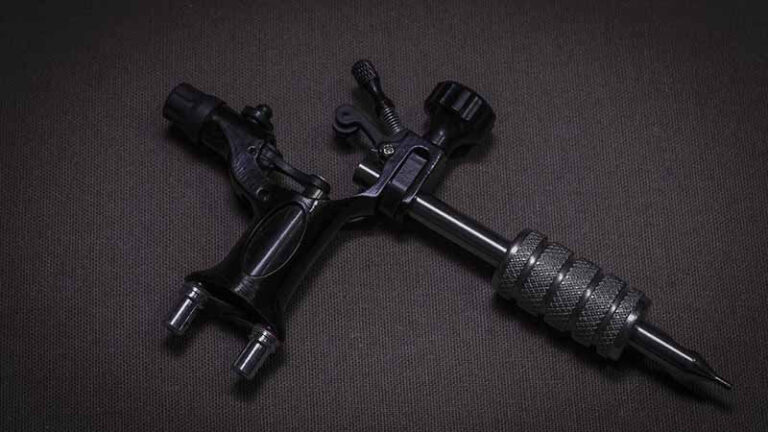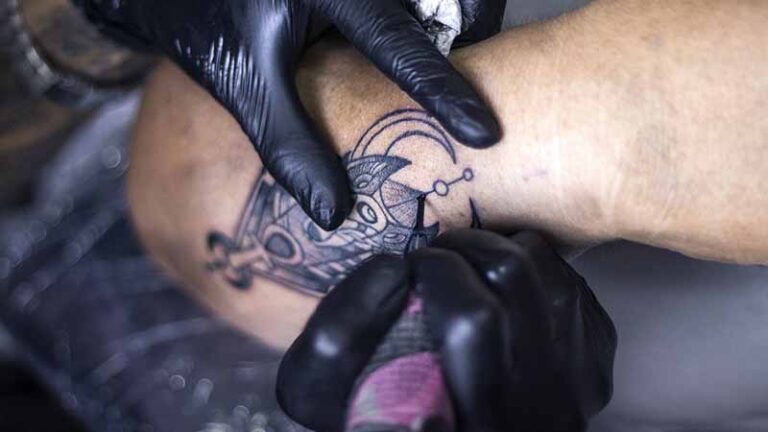How Long Do Henna Tattoos Last?
Henna tattoos are temporary tattoos that are created with a henna plant paste. The paste is applied to the skin in complicated designs and patterns, and it leaves a stain on the skin that can last anywhere from a few days to many weeks, depending on the conditions. Henna tattoos are a popular kind of body art that is often utilized for celebrations and events such as weddings and festivals in many cultures.
The henna plant, also known as Lawsonia inermis, is native to Africa, Asia, and Australia’s tropical and subtropical climates. The henna plant’s leaves contain Lawsone, a natural dye that is responsible for the coloring effect. When the leaves are crushed and combined with an acidic liquid, such as lemon juice or tea, to make henna paste, the dye is released. The paste is then applied to the skin with a cone or brush and dries in a matter of hours. When the paste is removed, the stain remains on the skin and fades over time.
Importance of knowing how long Henna tattoos last
Knowing how long henna tattoos endure is essential for a variety of reasons. For starters, it aids in the management of expectations. Henna tattoos are only temporary, and the longevity of the stain is determined by various factors, including skin type, tattoo site, henna quality, and aftercare. As a result, it is critical to have a reasonable idea of how long the tattoo will last.
Second, understanding how long henna tattoos endure might aid in planning specific events or occasions. For example, if someone is having a henna tattoo for a wedding, they will need to know how long it will last so that they can plan their appointment accordingly. Similarly, if a person gets a henna tattoo for a festival or a party, they should know how long it will remain so that they can organize their costumes and accessories properly.
Finally, knowing how long henna tattoos endure might aid in aftercare. Henna tattoos must be properly cared for in order for the stain to remain as long as possible. Knowing how long the stain will persist can assist people in planning their aftercare regimen and taking the necessary precautions to ensure that the stain lasts as long as feasible.
What is Henna?
History of Henna
Henna has been used for body art since ancient times. Henna is thought to have originated in Egypt and was used for ornamentation and mummification by the pharaohs. Henna was then popularized in other parts of the world, including India, the Middle East, and North Africa.
Henna has been utilized for hundreds of years in India and is an important component of the culture. It is utilized in a variety of rituals and celebrations, including weddings, festivals, and religious occasions. Henna is also used to keep the body cool in hot weather and to cure a variety of skin ailments.
Henna is typically utilized for weddings and other special occasions in the Middle East. The designs are usually detailed and elaborate, and they can completely cover the hands and feet. Henna is used for a variety of uses in North Africa, including ornamentation and medicine.
How Henna tattoos work
Henna tattoos operate by coloring the skin with the pigment lawsone, which is present in the henna plant’s leaves. The henna paste is created by crushing the henna plant’s leaves and combining them with an acidic liquid, such as lemon juice or tea. Using a cone or a brush, the paste is then applied to the skin in elaborate designs and patterns.
When the henna paste dries, it leaves a hard crust on the skin that must be removed. The dye in the henna paste penetrates the top layer of the skin, coloring it. The color of the stain can range from pale orange to dark brown, depending on factors such as henna quality, tattoo placement, and length of time the paste is kept on the skin.
Henna tattoo staining is not permanent and normally lasts for several days to several weeks. The stain’s longevity is determined by several factors, including skin type, tattoo site, henna quality, and aftercare. Proper upkeep, such as avoiding water and heat, can assist to extend the stain’s life.
Factors that Affect the Longevity of Henna Tattoos
Henna tattoos are temporary tattoos that can last anywhere from a few days to a few weeks. However, the stain’s longevity is determined by a number of circumstances.
Skin Type
The lifetime of a henna tattoo might be affected by the type of skin used. People with oily skin have a shorter lifespan for their henna tattoos because the oil in their skin causes the dye to fade faster. People with dry skin, on the other hand, may discover that their henna tattoos remain longer.
Location of Henna Tattoo
The placement of the henna tattoo on the body might also have an impact on its lifetime. Thicker skin parts, such as the palms and soles of the feet, tend to hold the dye longer than thinner skin areas, such as the back of the hand or the wrist. Because thicker skin absorbs more pigment and gives a better surface for the henna paste to cling to, it is preferred.
Quality of Henna
The quality of the henna used might also affect the tattoo’s lifetime. Fresh and pure henna will generate a darker and longer-lasting stain than lower-quality henna. Henna that has been blended with other compounds, such as PPD (para-phenylenediamine), can trigger allergic responses and shorten the tattoo’s lifespan.
Contact with Water
Because water causes the henna stain to fade faster, avoiding contact with water for at least 24 hours after obtaining a henna tattoo is critical. Swimming, showering, and dishwashing are examples of such activities. If water is unavoidable, a small layer of oil or balm can be placed on the tattoo to help protect it.
Maintenance
The lifetime of a henna tattoo can also be affected by proper treatment and maintenance. It is critical to maintaining the tattoo moisturized after the henna paste has been removed to prevent it from drying out and flaking off. A little layer of oil or balm applied to the skin can assist to keep it hydrated and preserve the tattoo from wear and tear.
How Long Do Henna Tattoos Last?
The average duration of Henna tattoos
The length of henna tattoos can vary depending on a number of factors, including the quality of the henna used, the location of the tattoo on the body, and the individual’s aftercare practices. Henna tattoos often endure between one and three weeks.
Examples of how long Henna tattoos last
A henna tattoo’s longevity varies from person to person, and there are various instances of how long they can last. Here are a couple of such examples:
- Light henna tattoos done to the hands or feet can last one to two weeks.
- Darker henna tattoos on the hands or feet might last for two to three weeks.
- Henna tattoos on the back or arms may not remain as long as those on the hands or feet and may fade after one to two weeks.
- Henna tattoos placed on the face or neck have a shorter lifespan than those done to the hands or feet, and may only last a few days.
It is crucial to remember that the length of a henna tattoo can be altered by various factors, including skin type, tattoo site, henna quality, and aftercare. Proper aftercare can assist to extend the life of the tattoo, but variables like water exposure or friction might cause the tattoo to fade faster.
Tips to Make Henna Tattoos Last Longer
Henna tattoos are temporary tattoos that can be a lovely way to decorate your skin for a short time. If you want your henna tattoo to survive as long as possible, there are certain tips and tactics you can use to help it endure longer. Here are some hints for extending the life of your henna tattoo:
Aftercare instructions
Aftercare is critical for a long-lasting henna tattoo. It is critical to maintaining the tattoo moisturized after the henna paste has been removed to prevent it from drying out and flaking off. To keep the skin hydrated, apply a small coating of oil or balm to the tattoo several times per day. It is also critical not to pick or scrape the tattoo since this might cause the dye to peel off.
Avoiding Water
Water might cause the henna tattoo to fade faster, so avoid contact with water for at least 24 hours after obtaining a henna tattoo. Swimming, showering, and dishwashing are examples of such activities. If you can’t avoid getting wet, add a tiny layer of oil or balm to the tattoo to help protect it.
Protecting the tattoo from heat
Heat can cause the henna tattoo to fade faster, so avoid exposing the tattoo to direct sunlight or heat sources like heaters or ovens. Avoiding activities that induce significant sweating might also assist to extend the life of the tattoo.
Reapplication
Consider reapplying henna paste to the pattern every few days to extend the life of your henna tattoo. Applying the new henna paste to the tattoo can assist in deepening and darkening the color, extending the life of the tattoo.
How to Remove Henna Tattoos
Natural Methods of Removing Henna Tattoos
Henna tattoos are temporary tattoos that fade naturally with time. However, if you need to remove the tattoo quickly, you might attempt some natural ways. Here are a couple of such examples:
- Lemon juice: Apply fresh lemon juice to the tattoo and gently rub it in. The citric acid in lemon juice can aid in the breakdown of henna color and the fading of tattoos.
- Baking soda: Make a paste with equal parts baking soda and water. Allow the paste to rest on the tattoo for a few minutes before rinsing it off with warm water. This approach can assist in exfoliating the skin and fading the tattoo.
- Olive oil: Gently massage a generous amount of olive oil into the tattoo. Allow for a few minutes before wiping it away with a clean cloth. This approach can assist in softening the skin and fading the tattoo.
Chemical methods of removing Henna tattoos
If natural methods do not work, or if you need to erase the tattoo rapidly, you can attempt chemical procedures. Here are a couple of such examples:
- Hydrogen peroxide: Apply a little amount of hydrogen peroxide to the tattoo and wait a few minutes before rinsing it with warm water. This procedure can assist in bleaching the skin and fading the tattoo.
- Nail polish remover: Soak a cotton ball in the nail polish remover and gently rub it over the tattoo. Allow for a few minutes before wiping it away with a clean cloth. This approach can aid in the dissolution of henna dye and the fading of tattoos.
- Rubbing alcohol: Apply a tiny amount of rubbing alcohol to the tattoo and allow it to sit for a few minutes before rinsing it with warm water. This approach can aid in the dissolution of henna dye and the fading of tattoos.
Chemical techniques can be harsh on the skin and might produce irritation or allergic responses. Before using any chemical techniques on the tattoo, it is best to test a tiny patch of skin first.
Conclusion
Henna tattoos have been used as a kind of temporary body decoration for ages. They are an excellent method to express yourself without committing to a permanent tattoo. Henna tattoos are natural and nontoxic, and they normally do not affect the skin. However, it is critical to recognize that the durability of a henna tattoo is determined by a variety of factors such as skin type, location, henna quality, and aftercare. As a result, it is critical to conduct thorough research and comprehend these elements before obtaining a henna tattoo.
Aftercare is essential for the longevity of a henna tattoo. Proper maintenance can assist to keep the tattoo’s vibrancy and sharpness while also preventing fading and early peeling. The aftercare instructions will differ based on the artist and the type of henna used, but there are some general guidelines that can help the tattoo stay longer.
Avoiding water for at least 24 hours after receiving the tattoo, avoiding direct sunshine and heat, using a natural moisturizer such as coconut oil to keep the skin hydrated, and avoiding any friction or rubbing on the tattoo region are some of this advice. It is also critical to follow the artist’s aftercare recommendations and avoid picking or scratching at the tattoo since this can cause the henna color to fade or flake off prematurely.







